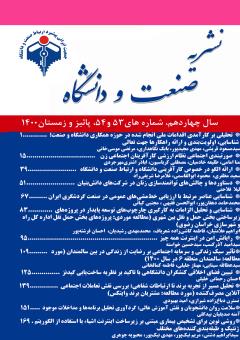دستاوردها و چالش های توانمندسازی زنان در شرکت های دانش بنیان
محورهای موضوعی : تخصصی
1 - دانشیار گروه مطالعات زنان، موسسه مطالعات فرهنگی و اجتماعی وزارت علوم، تحقیقات و فناوری، تهران، ایران
کلید واژه: زنان, توانمندسازی, مشارکت اقتصادی, شرکتهای دانشبنیان, فرصتها, چالشها,
چکیده مقاله :
پژوهش حاضر با هدف بررسی دستاوردها و چالشهای توانمندسازی زنان در شرکتهای دانش بنیان انجام شد. در این پژوهش فرصتها و چالشهای زنان دانشآموخته در شرکتهای دانشبنیان بر اساس تحلیل بیست مصاحبه با فعالین این حوزه مورد بحث قرار گرفت. جهت کسب اشراف نسبی به منظور طراحی سؤالات و مقولهبندی محتوای اسناد و مصاحبهها، ادبیات تجربی مرتبط با موضوع مطالعه و بررسی قرار گرفت. برمبنای نتایج در حوزه انگیزه پاسخدهندگان برای شروع کسب و کار خود، سه دلیل میل به ایجاد تعادل میان کار و زندگی، میل به کسب درآمد بیشتر، میل به توسعه مهارتهای کسب و کار را برشمردند. در زمینه عاملیت و عوامل موثر بر کارآفرینی زنان در محیط دانش بنیان ویژگیها و رفتارهای کارآفرینانه مانند میل به نتیجه، ریسکپذیری و خودباوری مورد سنجش قرارگرفته است. در بخش عوامل سازمانی و محیطی، ظرفیتهای سازمانی شامل اعتماد، امکان دسترسی به منابع و اطلاعات، توان شبکهسازی، قدرت جذب منابع، دانش مالی و استفاده از تکنولوژی و داشتن الگو تاثیرگذار بودند. در زمینه چالشها عوامل فردی (کمبود جسارت، احساسات زیاد، پایین بودن سطح معلومات تخصصی و فنی مرتبط با کار و کند بودن زنان)، عوامل اجتماعی–فرهنگی (تبعیض، کلیشههای جنسیتی رایج، باورهای مذهبی جامعه و عدم آگاهی و جامعهپذیری صحیح) و عوامل اقتصادی (تبعیض در استخدام و پرداخت دستمزد، نگاه منفی مشتریان و نهادهای مالی و پیشداوریها) مانعی برای حضور موثر زنان در شرکت های دانش بنیان عنوان شد
The present research was conducted with the aim of investigating the achievements and challenges of women's empowerment in knowledge-based companies. In this research, the opportunities and challenges of graduates women in knowledge-based companies were discussed based on the analysis of twenty interviews with women’s board members or directors in this field. Concerning to obtain relative superiority in order to design questions and categorize the content of documents and interviews, empirical literature related to the research was reviewed. Result revealed that three major factors have motivated them to start their own business including: the desire to balance work and life, the desire to earn more money, and the desire to develop business skills. In the field of agency and factors affecting women's entrepreneurship in the knowledge-based environment, entrepreneurial characteristics and behaviors such as results achievement, risk-taking, and self-confidence have been measured. From organizational and environmental aspects, organizational capacities including trust, access to resources and information, networking skills, ability to generate resources, financial knowledge, technology skills and having role models were influential. In terms of challenges, there are Individual factors (lack of courage, high emotions, low level of specialized and technical knowledge related to work and slowness of women), Socio-cultural factors (discrimination, common gender stereotypes, religious norms and beliefs and lack of knowledge and proper socialization) and Economic factors (discrimination in hiring and payment of wages, negative attitude of customers and financial institutions and prejudices) were addressed as obstacles to the effective participation of women in knowledge-based companies
